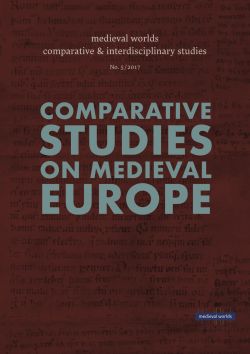 |
 |
Walter POHL – Andre GINGRICH (Eds.)
medieval worlds • no. 5 • 2017
medieval worlds 5 (2017)
Andrea Ruddick
S. 57 - 69 doi: 10.1553/medievalworlds_no5_2017s57
Verlag der Österreichischen Akademie der Wissenschaften
Abstract:
Late medieval English chronicles contain several puzzling references to the idea of people ›becoming English‹ by changing allegiance, usually in the context of war. How does this fit in with the predominantly ›racial‹ understanding of nationhood that permeated late-medieval English literary texts and official rhetoric, based on well-established ideas about birth, blood and heredity? These assumptions provided a powerfully persistent backdrop to late- medieval English writers’ constructions of national identity and culture, which had an impact not only in literary spheres but also on government rhetoric and policy. Was it possible for a person to change nationality by changing sides? It is argued that these scattered re ferences by certain chroniclers to ›becoming‹ English, French or Scottish refer not to an actual change in nationality as a legal and political status but act as a shorthand way of describing an anomalous change of political allegiance. Such instances of changing sides went against the grain of the political behaviour expected from a person born into a certain nationality but they did not change that nationality, which was associated with blood and birth. The essay goes on to examine the language of denization, by which foreigners were granted the legal rights and privileges of a native-born English person. From a close examination of the range of Latin vocabulary used in official documents, it is argued that even denization did not effect a change in the perceived nationality of the recipient, but only allowed for them to be treated as if they were English, in certain circumstances. Moreover, this new legal status did not automatically remove the alien social and cultural identity of recipients in the eyes of local political society, particularly at times of political tension such as the Glyn Dŵr revolt in Wales or outbreaks of war with France. By teasing out the implications of these puzzling uses of language and terminology, it is possible to refine and complicate our understanding of the intersection of ideas about race, subject-hood, allegiance, and nationality in both the texts and the politics of late medieval England.
nationality; medieval England; English; race; ethnicity; national identity; war; denization; Welsh; allegiance; aliens; immigration Published Online:
2017/06/30 14:08:32 Object Identifier:
0xc1aa5576 0x00369e49
Rights:All rights reserved.For questions regarding copyright and copies please contact us by email.
MEDIEVAL WORLDS provides a new forum for interdisciplinary and transcultural studies of the Middle Ages. Specifically it encourages and links comparative research between different regions and fields and promotes methodological innovation in transdisciplinary studies. Focusing on the Middle Ages (c. 400-1500 CE, but can be extended whenever thematically fruitful or appropriate), MEDIEVAL WORLDS takes a global approach to studying history in a comparative setting.
MEDIEVAL WORLDS is open to regular submissions on comparative topics, but also offers the possibility to propose or advertise subjects that lend themselves to comparison. With a view to connecting people working on related topics in different academic environments, we publish calls for matching articles and for contributions on particular issues.
Table of Contents
Walter POHL, Editor’s Introduction
The Sudden Success of Prose –
a Comparative View of Greek, Latin, Old French and Old Norse
Lars Boje Mortensen
Could Isidore’s Chronicle Have Delighted Cicero? A Response
Richtard W. Burgess and Michael Kulikowski
Revisiting Pre-Modern Ethnicity and Nationhood: Preface
Ilya Afanasyev and Nicholas S. M. Matheou
»Becoming English«: Nationality, Terminology,
and Changing Sides in the Late Middle Ages
Andrea Ruddick
Reinventing Roman Ethnicity in High and Late Medieval Byzantium
Yannis Stouraitis
The Characteristics of Bodies and Ethnicity c. 900-1200
Claire Weeda
Rethinking Ethnicity and ›Otherness‹ in Early Anglo-Saxon England
James M. Harland
Church, Apostle and People in Early Ireland
Patrick Wadden
Digitising Patterns of Power (DPP):
Applying Digital Tools in the Analysis of Political and Social Transformations
in the Historical Region of Macedonia (12th–14th Centuries)
Mihailo St. Popović and Veronika Polloczek
The Bible in Historical Perception and Writing
of the Transcultural Iberian Societies, Eighth to Twelfth Centuries
Matthias Tischler und Patrick Marschner
The journal is funded by the Austrian Science Fund (FWF).

|





 Home
Home Print
Print
 References
References
 Share
Share
